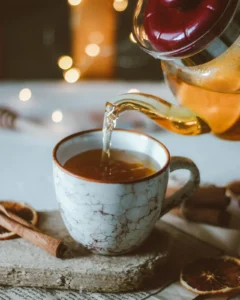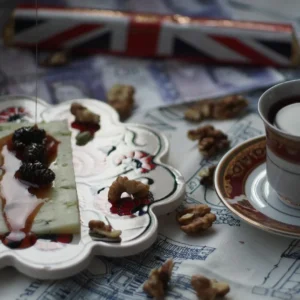British Cuppa Tea: Origins and Meaning
In the UK, a British cuppa tea is one of the most cherished traditions, offering comfort, connection, and everyday joy. Whether it’s shared during a quick chinwag or sipped in quiet contemplation, tea holds a central place in British life. And yet, it’s not just the beverage itself that’s iconic – it’s how it’s spoken about. The term “cuppa” may seem like a quaint nickname for tea, but its roots, evolution, and cultural significance tell a much deeper story.
A Linguistic Shortcut with Lasting Charm
 The term cuppa is simply a contraction – a mashed-up form of “cup of.” But this little word carries far more weight than its two syllables suggest. While it can technically refer to anything in a cup, in Britain, the unspoken understanding is that it means tea.
The term cuppa is simply a contraction – a mashed-up form of “cup of.” But this little word carries far more weight than its two syllables suggest. While it can technically refer to anything in a cup, in Britain, the unspoken understanding is that it means tea.
The earliest known appearance of cuppa in print was in 1925, courtesy of P.G. Wodehouse, the much-loved British author famed for his wit and comedic prose. Since then, the word has taken on a life of its own, now comfortably embedded in the everyday British lexicon.
Ask anyone for a cuppa in the UK, and you’ll almost certainly be offered a proper brew, with milk, sugar, or both – and possibly even a biscuit or two to go with it.
Not Just Tea – A Cultural Staple: British Cuppa Tea
Tea is more than just a drink in Britain; it’s a national pastime, a comfort ritual, and a way to socialise. Saying “fancy a cuppa?” is about more than hydration – it’s an invitation for connection. Whether at home, in the office, or even at the hairdresser’s, there’s always time for a cuppa.
And the use of cuppa has transcended the kitchen. You’ll often hear people refer to something as “not my cuppa tea” when describing something that doesn’t suit their tastes. It might be music, fashion, or a TV show – but the meaning is clear. This expression adds personality and a dash of dry British humour to everyday conversation.
Slang: The Soul of Spoken British English
Brits are masters of linguistic creativity. From calling food nosh or grub to referring to the evening meal as tea (especially in the North), British English is brimming with charming colloquialisms.
Booze for alcohol, bangers and mash for sausages and mash, afters for dessert – these terms bring character to the language and make it uniquely British. Slang evolves with culture and often provides a window into regional habits, preferences, and quirks.
Just as Americans might casually say “a cup of joe” for coffee, or argue about whether it’s “soda” or “pop,” Britons have developed an entire cultural shorthand around tea. But unlike in the US, where a cuppa might be ambiguous, in Britain it’s universally understood – tea is the default.
The Power of Brevity and Familiarity: British Cuppa Tea
There’s something wonderfully efficient about British slang. It reflects a preference for brevity, clarity, and, often, a bit of playful understatement. Why say “Would you like a cup of tea?” when “Fancy a cuppa?” does the job with more charm?
Over time, this simplicity has made terms like cuppa feel not only familiar but comforting. They’re part of the national rhythm – a kind of verbal shorthand for warmth, routine, and togetherness.
Regional Colour Adds to the Fun
 British English is far from uniform. Travel from London to Yorkshire, from Cornwall to Glasgow, and you’ll hear different accents, dialects, and idioms. Some slang is universal, while other expressions are more local.
British English is far from uniform. Travel from London to Yorkshire, from Cornwall to Glasgow, and you’ll hear different accents, dialects, and idioms. Some slang is universal, while other expressions are more local.
Even the way people take their tea varies – strong and dark in some places, milky and sweet in others. But the one unifier across regions is the cuppa. It might be said with a different accent, but the sentiment remains the same: a shared moment over something simple and satisfying.
More Than Just Words: British Cuppa Tea
Slang like cuppa isn’t just fun to say – it reflects how Britons relate to one another. It’s informal, friendly, and inclusive. Offering someone a cuppa isn’t just about the tea; it’s a small act of hospitality, a way of saying “let’s sit down, have a chat, and take a moment.”
It’s no surprise then that the phrase continues to thrive in modern Britain. Despite changing tastes, with coffee chains on every high street and herbal infusions gaining ground, a cuppa still evokes the classic image of British tea – warm, strong, and comforting.
In Summary
The term cuppa may have simple origins, but its role in British culture is anything but trivial. It’s a linguistic gem – short, sweet, and packed with meaning. It reflects national identity, cultural history, and the social ritual of tea-drinking that remains close to the hearts of many across the UK.
So next time someone asks, “Fancy a cuppa?” – don’t just think of it as a question about tea. Think of it as an invitation into one of Britain’s most enduring traditions.